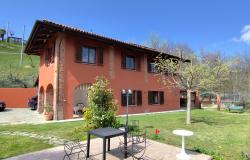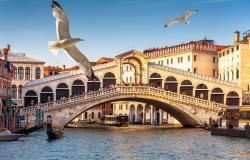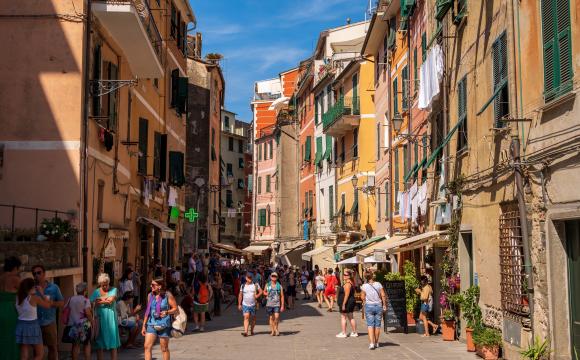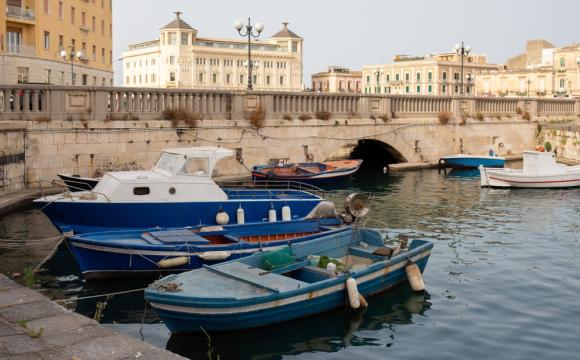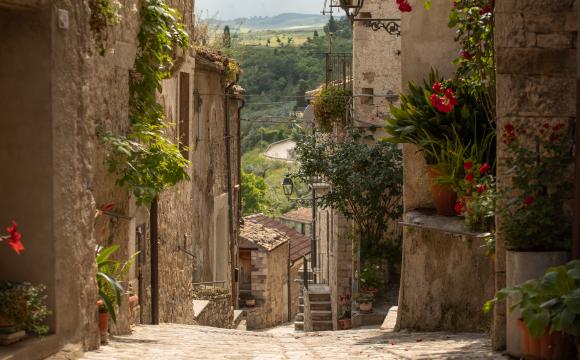For beginners and intenditori alike, one of the most enjoyable ways of learning more about Italian wines is to go direct to the source, that is, to knock on the door of a vineyard or wine estate and ask if you can visit and taste.
Provided that you don’t arrive at an inopportune moment (say, at lunch time or the start of the vendemmia – grape harvest), you will almost certainly be most welcome, at the humblest or even at the most famous internationally-known wineries alike.
Time permitting, you may be shown the cantina – cellar – and have the winemaking process explained; you will see where the wines age and mature, perhaps in large Slavonian oak botti, in new French oak barriques, or in bottiglia – in the bottle.
‘Vedi cosa Bevi’
 The Movimento per il Turismo del Vino, founded in 1993 with the motto ‘vedi cosa bevi’ – see (or experience) what you drink – encourages intelligent and thoughtful wine tourism through the publication of regional and local booklets with suggested itineraries and the contact details of estates that welcome visitors.
The Movimento per il Turismo del Vino, founded in 1993 with the motto ‘vedi cosa bevi’ – see (or experience) what you drink – encourages intelligent and thoughtful wine tourism through the publication of regional and local booklets with suggested itineraries and the contact details of estates that welcome visitors.
The Movimento furthermore organises national happenings such as the annual ‘cantine aperte’ initiative in late May which sees literally hundreds of wine estates opening their doors to the public.
The ‘benvenuta vendemmia’ in autumn serves to encourage visitors to experience the wine country during its most suggestive and atmospheric time: when the grapes are coming in.
In Italy the person who shows you around will not be some professional guide or public relations representative but most usually the estate owner himself/herself or perhaps the owner’s son or daughter.
You may be offered the chance to taste wines not in some fancy tasting room, but around a kitchen table or in a sitting room.
Where to begin?
If you are planning to visit Italy and know that you will be in an area where one of your favourite wines is produced, you may wish to go to the trouble of contacting a winery in advance to arrange a visit.
More than likely, however, you will be staying somewhere in the country and simply discover a wine that you really enjoy drinking. You check the label to see where it is made and then set out to hunt down the estate.
You may find, on arrival down a road (or sometimes dirt track), that the home of your wine is a simple farm or smallholding; a private estate or azienda agricola (which produces wines entirely from its own grapes); a large scale winery or casa vinicola (a winery that may both grow its own grapes as well as buy in grapes from small growers); or a cantina cooperativa (a cooperative winery).
So take courage, don’t be hesitant: get out a map, locate your estate, and either telephone first, or else just take pot luck and knock on the door…
Agriturismo
 One of the most enjoyable ways to experience wines at the source is actually to stay on a wine estate. In recent years, there has been a huge upsurge in farmhouse tourism – agriturismo – as farmers seek to supplement income by restoring former tenant farmers’ houses and outbuildings into attractively appointed cottages to rent, sometimes set amongst the vineyards, sometimes with amenities such as swimming pools.
One of the most enjoyable ways to experience wines at the source is actually to stay on a wine estate. In recent years, there has been a huge upsurge in farmhouse tourism – agriturismo – as farmers seek to supplement income by restoring former tenant farmers’ houses and outbuildings into attractively appointed cottages to rent, sometimes set amongst the vineyards, sometimes with amenities such as swimming pools.
One of the great attractions is that you can usually buy the estate’s wine and olive oil, as well as visit the cellars in a leisurely manner to learn how the wines are made. Some estates even have simple or more sophisticated farmhouse restaurants where genuine local foods can be enjoyed alongside the estate’s wines, which you will soon come to consider your wines.
Enoteche
Where do Italians themselves buy their wines? When we lived in Tuscany, my neighbour and friend Giuliano would go to his cousin’s farm to purchase vino sfuso, that is ‘open wine’ siphoned direct from the vat into cane-covered 25- or 54-litre damigiane – demi-johns.
The concept of purchasing wines from a specialist wine shop is a relatively recent one for Italians, but more and more quality enoteche are appearing all the times.
 A congenial and well-run enoteca can be one of the most enjoyable places to learn about and enjoy Italian wines. The owner or proprietor will delight in imparting his views on who are the best producers, and can often help to arrange visits for you. And of course, you can purchase a range of different wines so that you can taste and discover those that you like best, then seek them out direct at the source.
A congenial and well-run enoteca can be one of the most enjoyable places to learn about and enjoy Italian wines. The owner or proprietor will delight in imparting his views on who are the best producers, and can often help to arrange visits for you. And of course, you can purchase a range of different wines so that you can taste and discover those that you like best, then seek them out direct at the source.
Sagre e Feste
Experiencing the wine country is not just about visiting vineyards. For wine, in Italy of all places, cannot be viewed as a product unconnected to the land, its people and culture.
It is not possible, for example, to really understand a local Italian wine without experiencing the local foods that go so well with it.
Similarly, one of the best ways to enjoy learning about wine is to take part in a wine festival or sagra del vino. This may be just a wholly local affair where the winegrowers let their hair down for an annual communal shindig; or else it can be an event that attracts visitors from throughout the region or even country.






